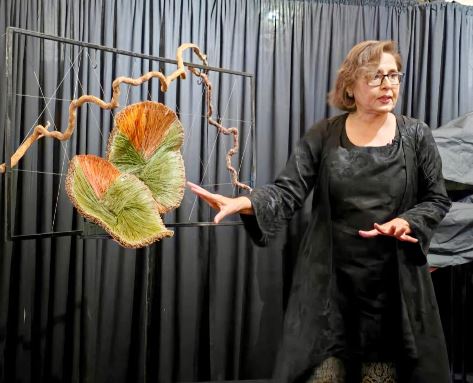Opinion
Ansar Mahmood Bhatti
Pakistani politics is a dynamic and ever-evolving landscape that rarely fails to capture attention. The phrase “never a dull moment” aptly describes the constant flux of activity, marked by a whirlwind of developments that unfold on a daily basis. These events keep the public, political analysts, and media highly engaged, fueling widespread debates and speculation.
On one hand, the relentless pace of political happenings ensures that there is always something new to discuss, whether it be parliamentary maneuvers, shifting alliances, legal battles, or policy decisions. On the other hand, this very dynamism often leads to a plethora of controversies, ranging from allegations of corruption and misuse of power to heated rivalries between political parties and institutions. The combination of high-stakes drama, deep-seated divisions, and an ever-watchful public ensures that Pakistani politics remains both captivating and contentious.
The recent development indicating the Pakistan Tehreek-e-Insaf (PTI)’s willingness to engage in talks with the government has introduced a new layer of intrigue to the already vibrant and volatile political landscape of the country. This gesture initially sparked interest and speculation about potential breakthroughs in the ongoing political stalemate. However, the momentum seemed to falter following former Prime Minister Imran Khan’s scathing criticism of the party’s leadership for their perceived conciliatory approach toward the government. Despite the apparent public setback, it is widely believed that informal, behind-the-scenes communications among key stakeholders continue, hinting at a possible recalibration of strategies by both sides. This unfolding situation underscores the fluid nature of the country’s political dynamics and the complex interplay of public narratives and private negotiations.
The key question is whether these talks will yield any meaningful results, given the starkly opposing views held by the PTI and the government on numerous issues. The PTI’s willingness to engage in dialogue with the government stems from widespread criticism, urging the party to prioritize discussions with political stakeholders rather than relying on apolitical forces, if it genuinely aims to strengthen democracy in the country. Otherwise, the PTI, which firmly regards the current government as an illegitimate entity assembled solely to sideline it from the political arena, risks reinforcing this perception of its approach.
The Pakistan Tehreek-e-Insaf (PTI) has outlined specific preconditions for engaging in talks with the government, including the formation of a judicial commission to investigate the May 9 incidents and the release of all political prisoners. However, the feasibility of such talks yielding any constructive outcomes seems highly doubtful.
One critical issue is that these conditions largely fall outside the government’s direct purview. The investigation into the May 9 incidents, which involved attacks on military installations, and the detention of political activists are matters deeply intertwined with the military establishment’s authority and influence. The government, therefore, lacks the mandate or capacity to address these demands independently.
Moreover, the Establishment, which holds significant sway in such matters, is unlikely to entertain discussions on these contentious issues. The May 9 incidents, in particular, have been framed by the Establishment as a direct challenge to its authority and an attack on national institutions.
The government’s seriousness about engaging in meaningful talks with the PTI appears questionable, as there seems to be little inclination within its ranks to pursue dialogue earnestly. This reluctance can be attributed to several factors. First, the government is acutely aware of its powers and mandate, which grants it the prerogative to decide whether or not to engage in negotiations.
Second, the government likely recognizes that negotiations inherently involve concessions. Any meaningful dialogue would require a level of flexibility and willingness to reach a “give-and-take” arrangement. However, this could lead to demands from the PTI that the government finds politically or strategically disadvantageous, such as agreeing to early elections or other significant shifts in policy or governance.
In light of these factors, the government might perceive the potential risks of negotiations as outweighing the benefits, especially if it feels that conceding to PTI demands could weaken its position or set an unwelcome precedent. Consequently, engaging in such talks could be seen as placing itself in a precarious or “weird” situation, which it is understandably keen to avoid. This lack of incentive to compromise significantly undermines the prospects of productive dialogue.
The PML-N ranks include a faction that strongly advocates for dialogue with the PTI, arguing that it aligns with the government’s broader strategic interests. This group contends that engaging in talks could serve as a tactical maneuver to reduce the likelihood of the government being ousted before completing its constitutionally mandated five-year term. They perceive the PTI’s relentless confrontational stance and repeated protests targeting the federal capital as key destabilizing elements that undermine governance and public confidence. Furthermore, these disruptions have been identified as significant barriers to attracting foreign direct investment, which is crucial for the country’s economic recovery and growth.
Proponents of this approach believe that initiating discussions with the PTI could create an environment of political stability, which is essential for maintaining investor confidence and fostering national development. They argue that even a partial resolution or temporary truce could help ease tensions, allowing the government to focus on pressing economic and administrative priorities without the constant specter of political unrest. By addressing the underlying friction through dialogue, this group hopes to mitigate the risks posed by the PTI’s adversarial tactics and contribute to a more stable political landscape.
But as the saying goes, if wishes were horses, beggars would ride. The ruling clique must recognize that its mandate and powers are limited. The real authority lies with those who have constructed the entire system. It ultimately depends on them whether the government is permitted to engage in such talks—especially if they intend to bring in a new setup in the near future.












